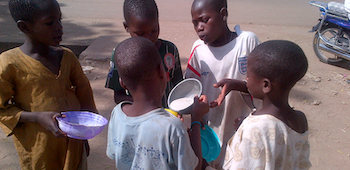
The Scourge of the Almajiri Training System in Northern Nigeria and Its Impact on Youth Mental Health
The Almajiri system, a traditional Islamic education practice in Northern Nigeria, has evolved over centuries. Originally established as a noble endeavor to provide religious and moral education, it has sadly deteriorated into a mechanism of systemic neglect and abuse. This transformation has had profound implications for the mental health of many Northern Nigerian youths who pass through this system.
The Historical Context and Evolution of the Almajiri System
The Almajiri system traces its roots to the Kanem-Borno Empire and the Sokoto Caliphate, where it played a pivotal role in educating young boys in Islamic teachings, Arabic literacy, and vocational skills. Pupils, referred to as Almajirai, were sent to study under Islamic scholars, often traveling great distances from their homes. Communities provided support through almsgiving and communal care.
However, the collapse of this communal support system, exacerbated by colonial disruptions and post-colonial socio-economic challenges, has led to the present-day reality where Almajirai are frequently found begging on the streets to survive. The deterioration of this once-honorable educational framework into a conduit of hardship and deprivation represents a tragic fall from its original intent.
Almajirai often face social exclusion and discrimination. Viewed as societal outcasts, they struggle with low self-esteem and a lack of social belonging. This stigmatisation affects their mental health and their ability to integrate into mainstream society.
The Present-Day Challenges of the Almajiri System
Today, the Almajiri system is characterized by overcrowded and underfunded schools, with inadequate infrastructure and teaching resources. Many Almajirai live in deplorable conditions, often lacking access to basic necessities such as food, clean water, and healthcare. This neglect has far-reaching consequences on their physical and mental well-being.
The Mental Health Impact on Almajirai
- Psychological Trauma and Stress: The constant struggle for survival and the harsh realities of street life expose Almajirai to chronic stress and trauma. Begging for alms, facing social stigma, and experiencing neglect and abuse contribute to severe psychological distress. The lack of parental care and protection further exacerbates feelings of insecurity and abandonment.
- Educational Deprivation and Its Consequences: While the Almajiri system aims to provide religious education, the lack of a comprehensive curriculum leaves students ill-prepared for modern societal demands. This educational deprivation limits their future opportunities, leading to a cycle of poverty and marginalization. The frustration and hopelessness associated with such bleak prospects significantly impact mental health, fostering a sense of inferiority and disenfranchisement.
- Social Isolation and Stigmatization: Almajirai often face social exclusion and discrimination. Viewed as societal outcasts, they struggle with low self-esteem and a lack of social belonging. This stigmatization not only affects their mental health but also hampers their ability to integrate into mainstream society, perpetuating a cycle of exclusion and mental health challenges.
- Substance Abuse and Coping Mechanisms: In a bid to cope with their harsh realities, some Almajirai may resort to substance abuse. This maladaptive coping mechanism further deteriorates their mental and physical health, creating additional barriers to their well-being and social integration.
Addressing the Mental Health Crisis: A Call for Action
To mitigate the mental health impact of the Almajiri system, a multifaceted approach is imperative:
- Comprehensive Reform of the Almajiri System: There is a need for government and community-driven reforms to integrate the Almajiri system into the formal education sector. Providing a balanced curriculum that combines religious and secular education will equip Almajirai with the skills needed to thrive in contemporary society.
- Improved Living Conditions and Welfare: Ensuring that Almajirai have access to basic necessities, healthcare, and safe living conditions is crucial. Implementing social welfare programs tailored to their needs can significantly enhance their quality of life and mental well-being.
- Mental Health Support and Counseling: Establishing mental health support services, including counseling and psychosocial support, will help address the trauma and psychological distress experienced by Almajirai. Training teachers and caregivers in mental health awareness and support is also essential.
- Community Sensitization and Integration: Efforts to reduce stigma and foster social inclusion are vital. Community sensitization programs can promote acceptance and support for Almajirai, facilitating their integration into mainstream society and enhancing their sense of belonging and self-worth.
- Economic Empowerment Initiatives: Providing vocational training and economic opportunities for Almajirai will enable them to break the cycle of poverty. Empowering them with skills and resources to secure livelihoods is key to their mental health and overall well-being.
Conclusion
The Almajiri system, in its current form, represents a significant challenge to the mental health and well-being of Northern Nigerian youths. By addressing the root causes and implementing holistic reforms, we can transform this system into a source of empowerment and hope. Ensuring that Almajirai receive comprehensive education, social support, and mental health care will not only uplift their lives but also contribute to the overall development and stability of Northern Nigeria.
All Categories
Recent Posts
Presidents’ Welcome
+234 908 7486 805
helpdesk@imcwfoundation.org




